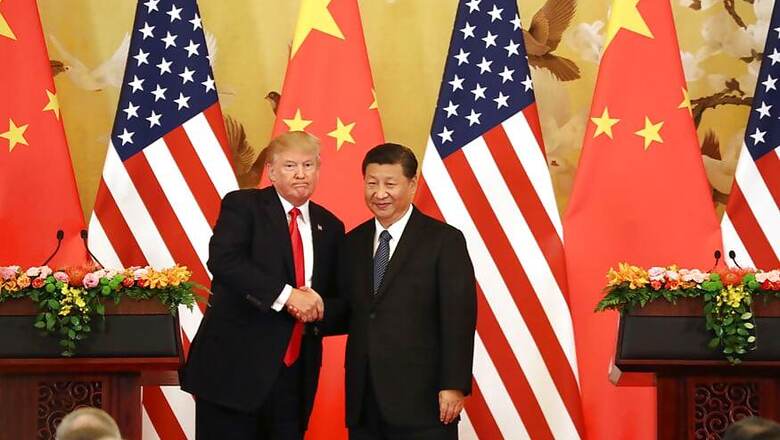
views
Beijing: Chinese President Xi Jinping and his US counterpart Donald Trump's decision to suspend imposing of any new tariffs for 90 days for talks to address the trade dispute has put brakes on the escalating trade war between the world two largest economies, a relived China said on Sunday.
At their "highly successful" dinner meeting on the sidelines of the annual G-20 Summit in Argentina's capital Buenos Aires, Trump agreed to postpone for 90 days a scheduled increase in tariffs on USD 200 billion in Chinese imports, while Xi agreed to purchase a very substantial amount of US products so as to reduce the USD 375 billion trade deficit between the two countries.
During the meeting, which had also raised global expectations of an end to the six-month-long trade war, Trump agreed that on January 1, 2019, he will leave the tariffs on USD 200 billion worth of product at the 10 per cent rate, and not raise it to 25 per cent at this time.
If there is no deal at the end of the 90-day grace period, the US will increase the tariffs on the USD 200 billions of goods from 10 per cent to 25 per cent.
Addressing the media, at Buenor Aires, after the talks, Chinese Foreign minister Wang Yi acknowledged that China would import more from the US and address Washington's concerns in the 90-day period.
"In a friendly and candid atmosphere, the two presidents had profound discussions that lasted for two-and-a-half hours. The time was much longer than the schedule," the state-run Xinhua news agency quoted Wang as saying.
It was the first face-to-face meeting between the two leaders since Trump's China visit in November last year and since both countries started imposing tit-tat tariffs on each other's exports.
According to Wang, the two presidents reached important common understanding and the meeting certainly has "charted the course for China-US relations in some time to come."
During their working dinner, the two leaders had very "positive and constructive" discussions over trade and economic issues and agreed not to impose additional tariffs, he said, adding that China will import more marketable products form the US in efforts to gradually ease imbalances in bilateral trade.
Wang said the two sides also agreed to open market to each other and China will, in the process of its further opening-up, work to gradually resolve the legitimate US concerns.
Trump has been demanding China to drastically reduce the USD 375 billion trade deficit and ensure IPR production for US technology and services. The escalating trade war raised concerns in China as its economy was on the downward trend amid efforts by the government to rejig the export dependent economy to that of relying more on domestic consumption.
Wang said that working teams on both the sides will follow the guidance of the principled consensus reached between the two leaders, and step up negotiations toward the removal of all additional tariffs so as to reach a mutually-beneficial agreement at an early date.
"The important consensus reached at the meeting not only effectively stopped further escalation of trade tensions, but also opened up new prospects for win-win cooperation between the two countries," the Chinese foreign minister said.
Results achieved at the meeting will not only benefit the two countries and the two peoples, but also be conducive to the stable growth of the global economy, he said.
The two sides also agreed to enhance cooperation on law enforcement and combating illicit drugs, including the synthetic drug fentanyl, Wang said.
Exports of Fentanyl from China became the latest source of friction between the two countries as it has emerged as a new source of drug abuse in the US in addition to heroin, resulting in large scale deaths of American youth.
China's efforts to tackle the abuse of fentanyl-like substances have won positive comments from across the globe and Beijing has decided to list all fentanyl-like substances and their precursors as controlled substances, Wang said.
"Saturday's meeting has put the brakes on escalating trade friction between the two countries. The two sides decided to avoid escalation of trade restrictive measures and will work towards lifting all additionally-imposed tariffs," Xinhua said.
The outcome of the meeting needs to be cherished. The economic teams of the two countries should follow the consensus reached by the two heads of state, it said.
The usually abrasive ruling Communist Party run Chinese tabloid, Global Times said "the progress made at the talks in Buenos Aires is of momentous significance since the Sino-US trade friction escalates this year".
"It is hoped the agreement reached on Saturday will be implemented by the two sides and Chinese and American working teams will meet the expectations of their leaders, normalising trade relations between the countries," it said.
Playing down domestic concerns of any compromise by China giving in to Trump's demands, it said "the Chinese public needs to keep in mind that China-US trade negotiations fluctuate. China's reform and opening-up's broad perspective recognises that the rest of the world does things differently."
Meanwhile, the state-run China Daily said in the editorial that "the fact that the two leaders could sit down for candid talks and agree to avoid the looming escalation of trade tariffs to allow for continuing trade negotiations, shows that both sides are aware of how damaging they would be, not just on each other but the global economy as a whole."


















Comments
0 comment